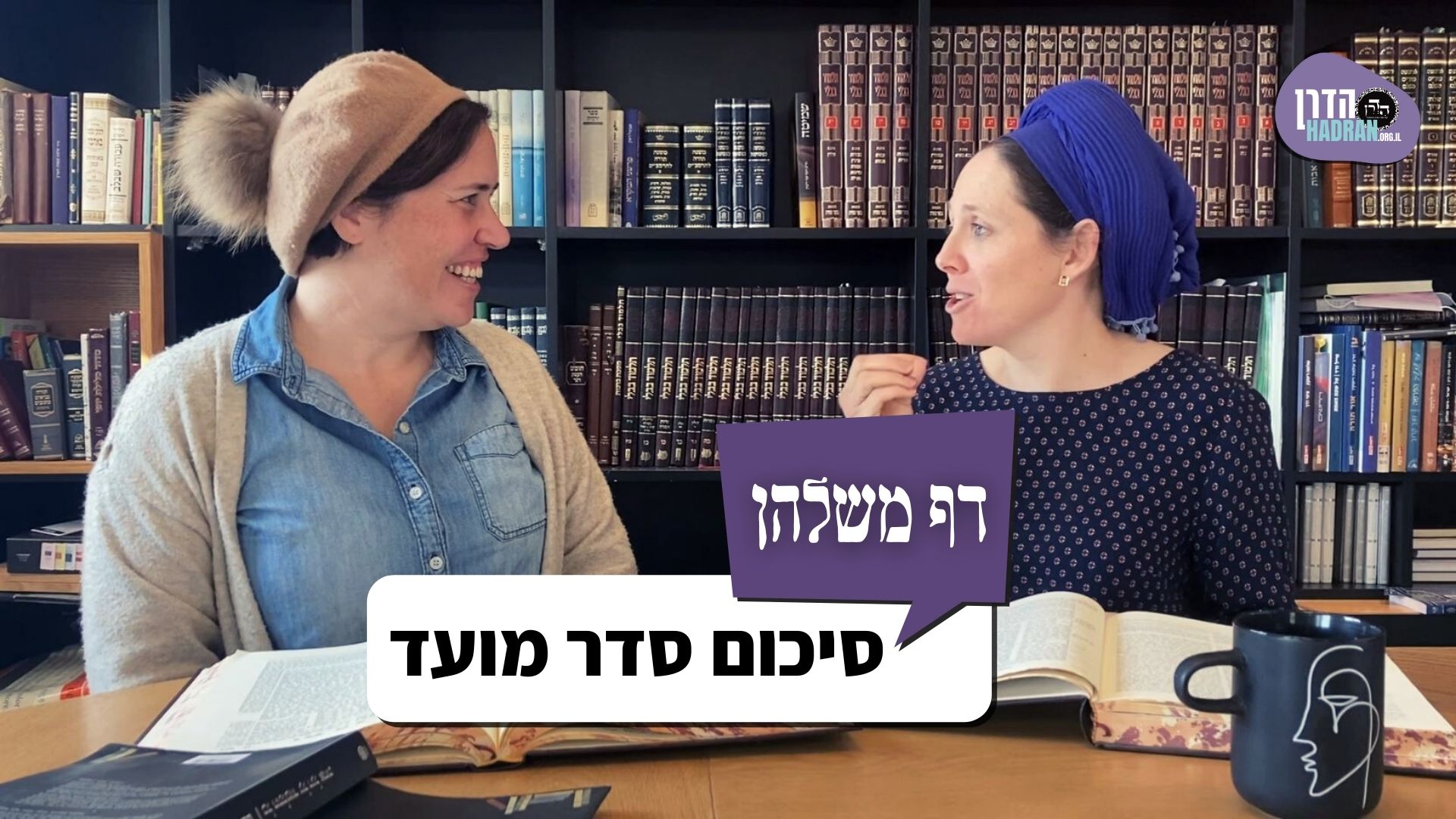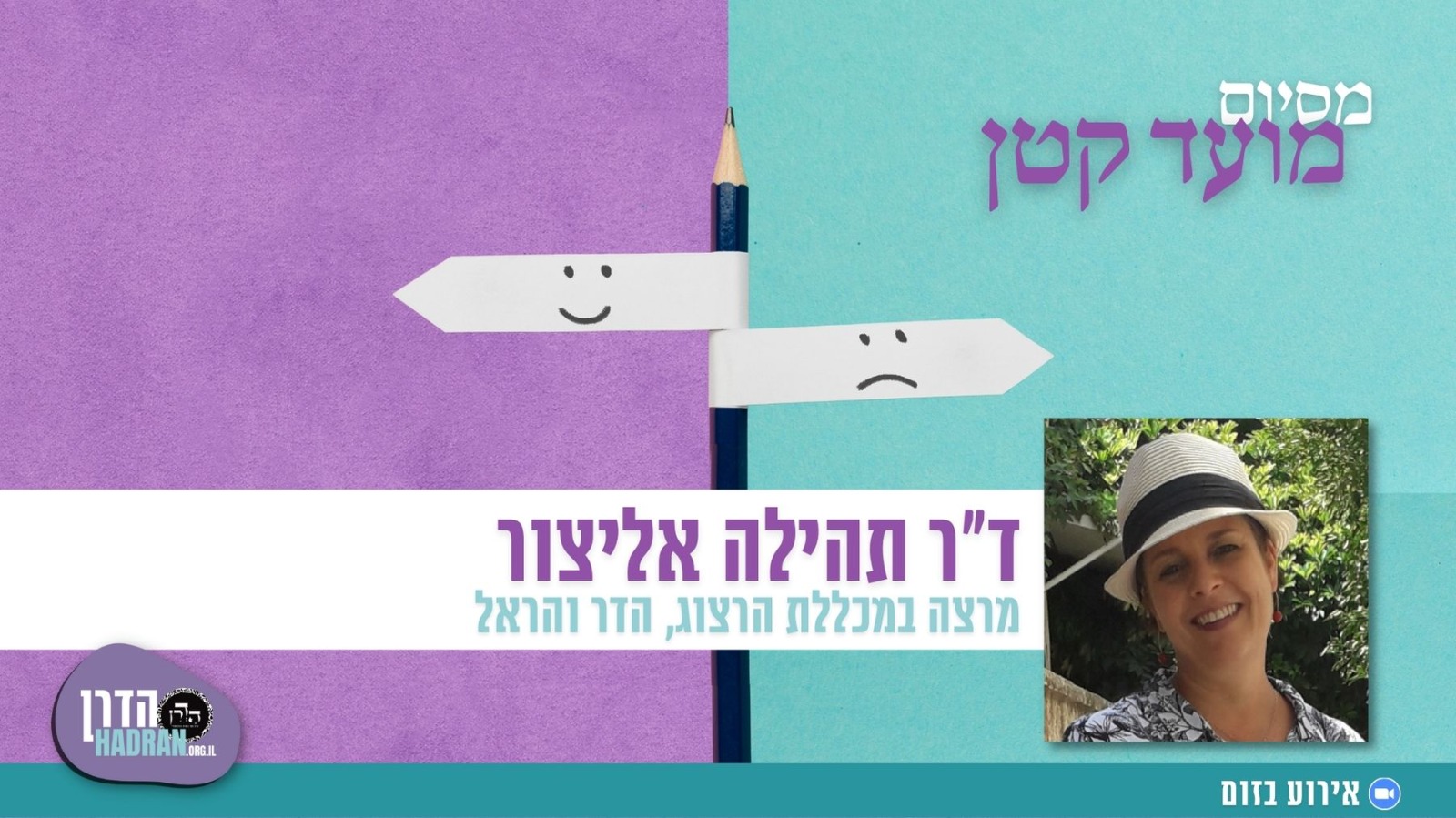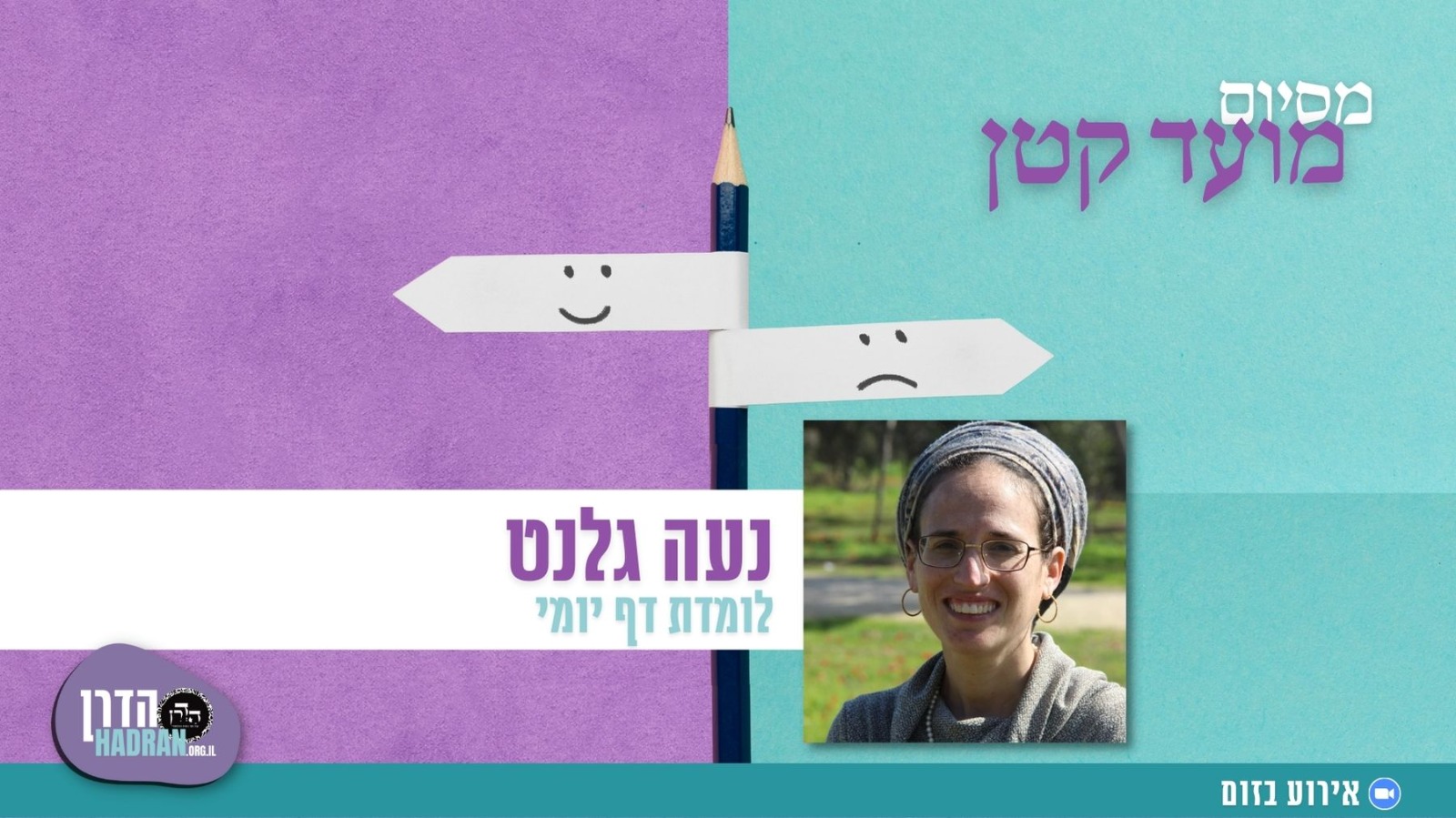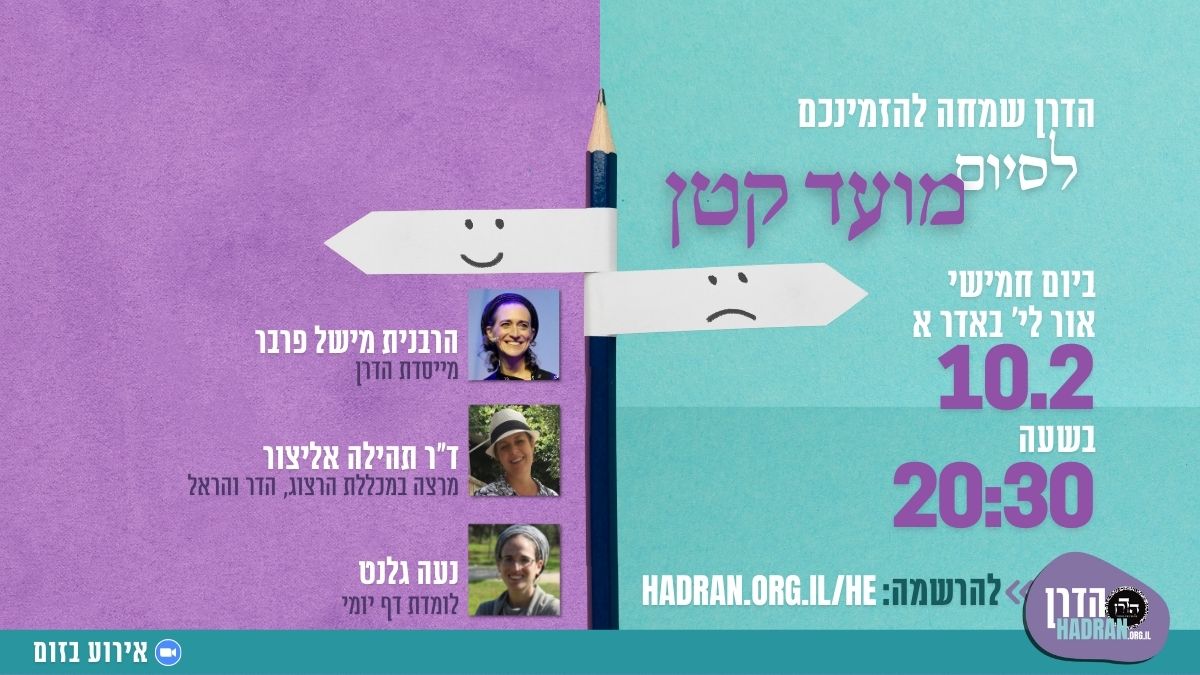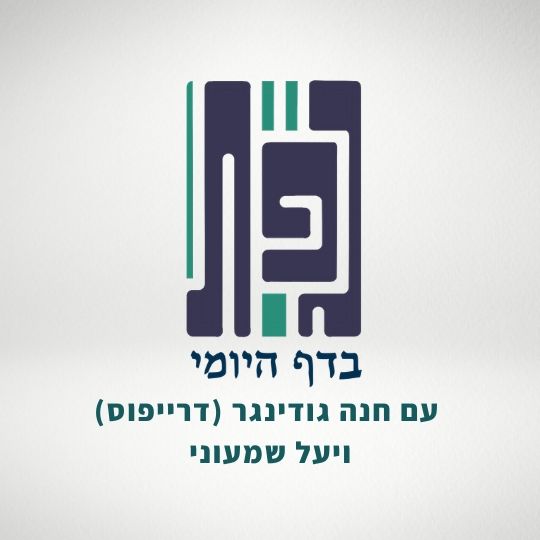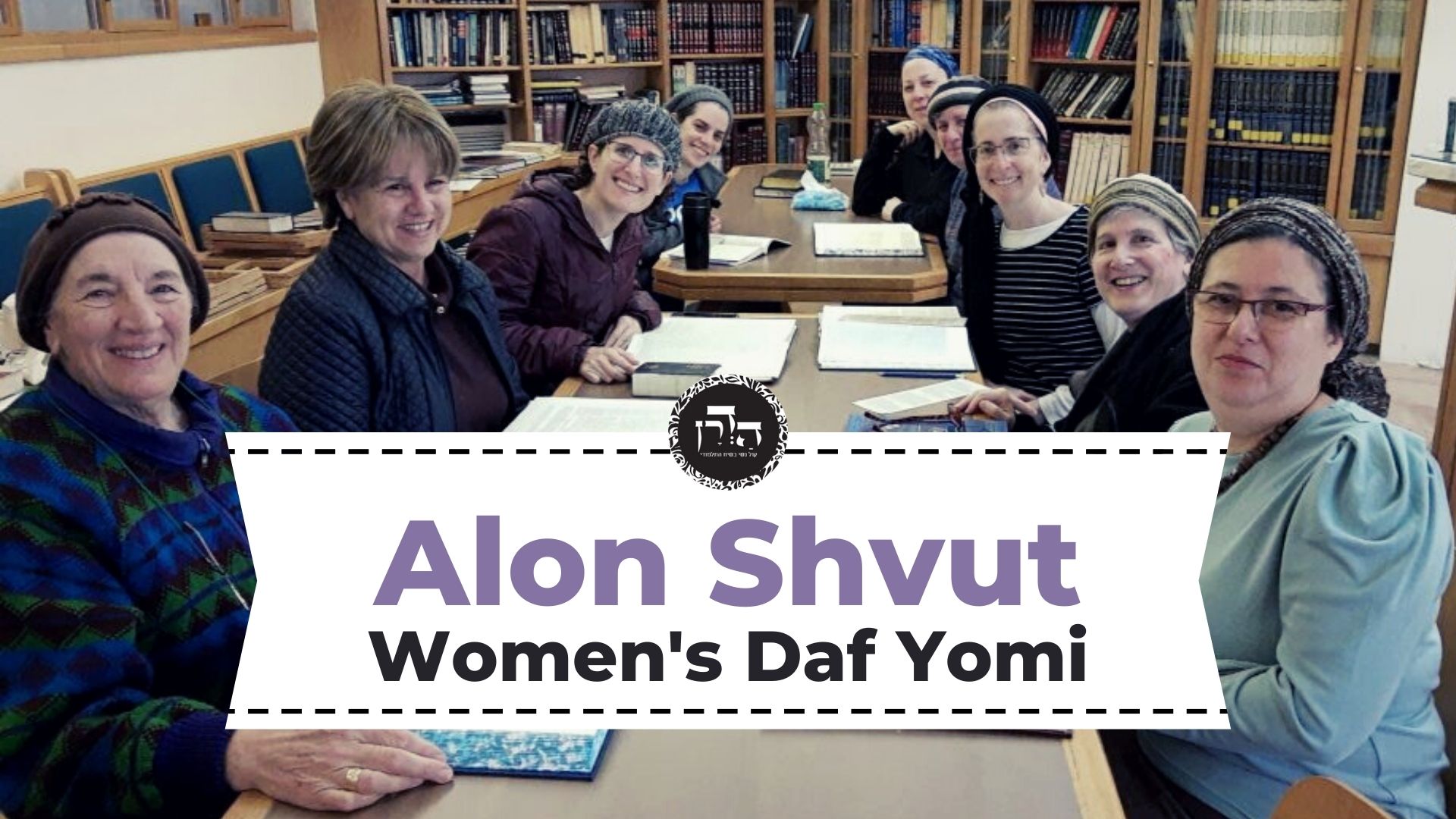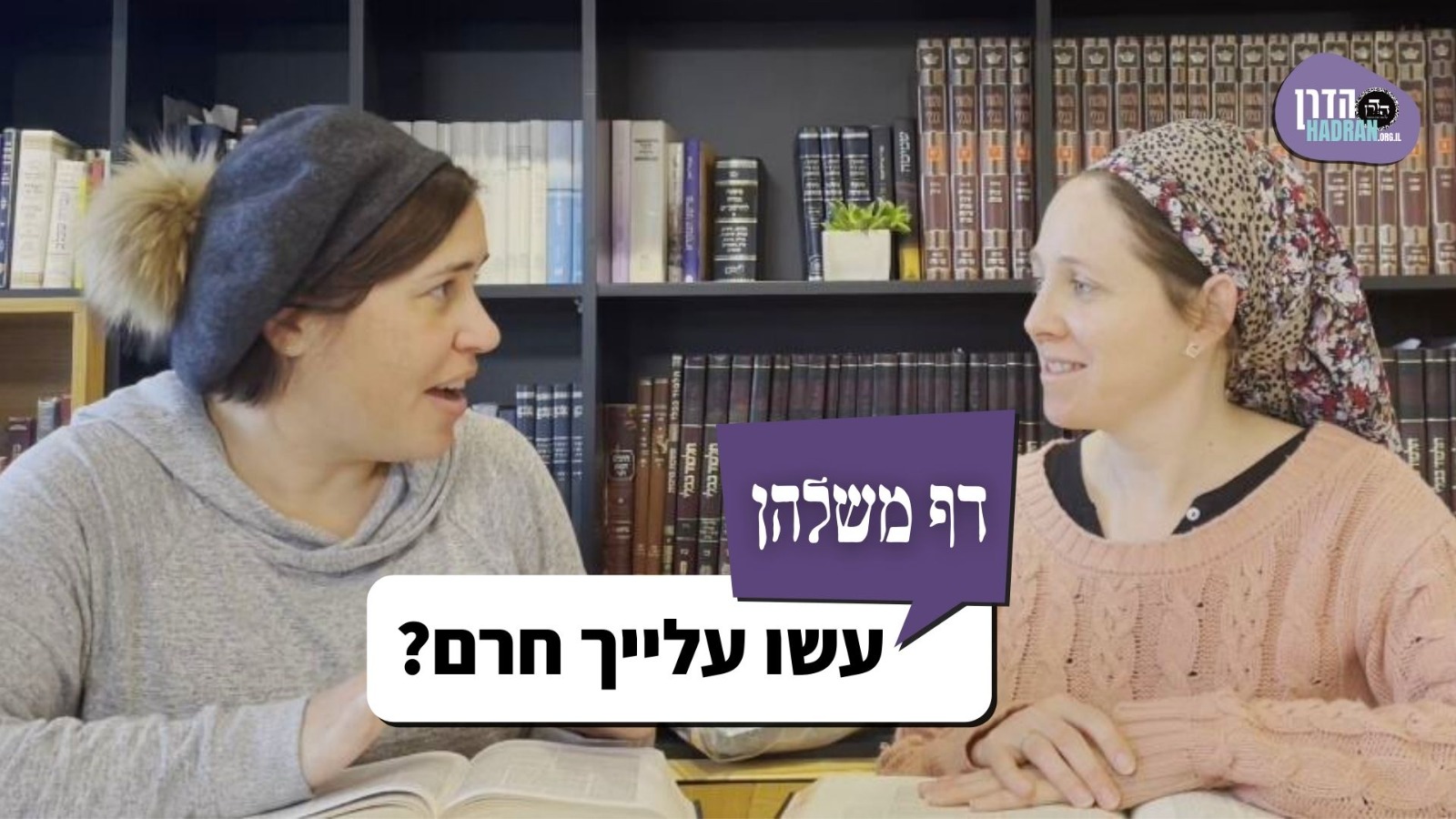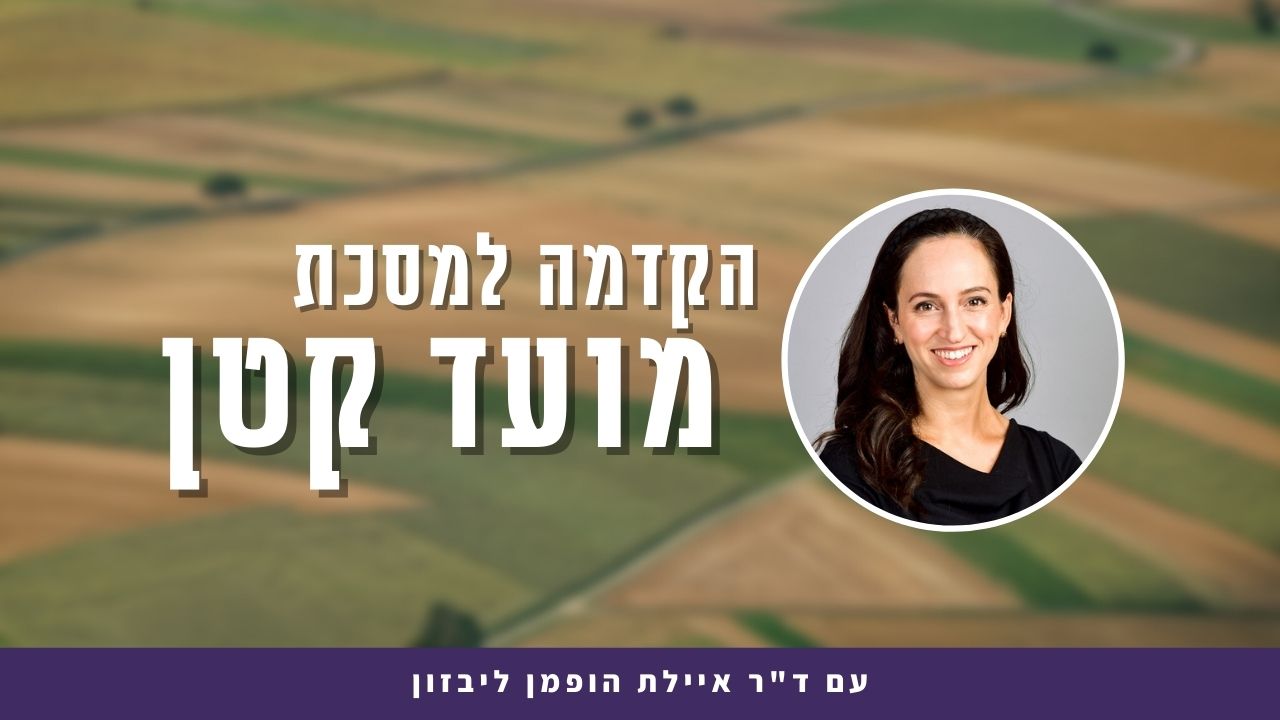מועד קטן כ
שֶׁכְּבָר נִתְעַסְּקוּ בּוֹ בָּרֶגֶל. כְּלָלוֹ שֶׁל דָּבָר: כׇּל שֶׁהוּא מִשּׁוּם אֵבֶל — רֶגֶל מַפְסִיקוֹ. וְכׇל שֶׁהוּא מִשּׁוּם עִסְקֵי רַבִּים — אֵין רֶגֶל מַפְסִיקוֹ.
for they already occupied themselves with him when they came to console him during the Festival. The general principle with regard to the matter is as follows: Any activity that is prohibited to the mourner because it is an expression of mourning is interrupted by the Festival and remains prohibited afterward. And anything that involves the public’s occupation with the mourner, e.g., coming to the mourner to offer him comfort and condolence, is not interrupted by the Festival, for people console the mourner during the Festival as well.
קְבָרוֹ שְׁלֹשָׁה יָמִים בְּסוֹף הָרֶגֶל — מוֹנֶה שִׁבְעָה אַחַר הָרֶגֶל, אַרְבָּעָה יָמִים הָרִאשׁוֹנִים — רַבִּים מִתְעַסְּקִין בּוֹ, שְׁלֹשָׁה יָמִים הָאַחֲרוֹנִים — אֵין רַבִּים מִתְעַסְּקִין בּוֹ, שֶׁכְּבָר נִתְעַסְּקוּ [בּוֹ] בָּרֶגֶל, וְרֶגֶל עוֹלֶה לוֹ.
If he buries his relative three days before the end of the Festival, the mourner must count seven days of mourning after the Festival because his mourning never began. On the first four days of his mourning, the public must occupy themselves with him and come to console him. On the three last days, however, the public need not occupy themselves with him, as they already occupied themselves with him during the Festival. That is to say, they certainly came to console him during the Festival, although the period of mourning did not actually begin until afterward. And the Festival counts for him toward the thirty-day mourning period.
מַאי לָאו — אַסֵּיפָא! לָא, אַרֵישָׁא.
With regard to the statement of the baraita that the Festival counts toward the thirty-day period of mourning: What, is it not referring to the latter clause of that baraita, which speaks about a case where the burial was performed during the Festival itself? If this is the case, then a refutation of Rava’s opinion is stated explicitly, that the Festival counts toward the thirty-day mourning period, even if the deceased was buried on the Festival itself. Rava rejects this argument: No, it is referring to the first clause, which discusses a case where the burial was performed before the Festival, and since rites of mourning were observed already before the Festival, the Festival is counted toward the thirty-day period of mourning. Therefore, it is not a refutation of Rava’s halakha.
אֵיתִיבֵיהּ: רֶגֶל עוֹלֶה לוֹ לְמִנְיַן שְׁלֹשִׁים, כֵּיצַד? קְבָרוֹ בִּתְחִילַּת הָרֶגֶל — מוֹנֶה שִׁבְעָה אַחַר הָרֶגֶל, ומְלַאכְתּוֹ נַעֲשֵׂית עַל יְדֵי אֲחֵרִים, וַעֲבָדָיו וְשִׁפְחוֹתָיו עוֹשִׂין בְּצִנְעָא בְּתוֹךְ בֵּיתוֹ, וְאֵין רַבִּים מִתְעַסְּקִין בּוֹ, שֶׁכְּבָר נִתְעַסְּקוּ בּוֹ בָּרֶגֶל, וְרֶגֶל עוֹלֶה לוֹ. תְּיוּבְתָּא.
Abaye raised an objection to Rava’s opinion from another baraita, in which it was taught: A pilgrimage Festival counts toward the thirty-day period of mourning. How so? If one buried his dead relative at the beginning of a pilgrimage Festival, he must count seven days of mourning after the Festival, and during this period his work is performed by others. And his menservants and maidservants perform this work in private inside his house, and the public need not occupy themselves with him and come to console him, for they already occupied themselves with him during the Festival. And the Festival counts for him. Here it is explicitly stated that the Festival counts toward the thirty-day period of mourning, even when the deceased was buried during the Festival itself. The Gemara concludes: This is indeed a conclusive refutation of Rava’s opinion.
כִּי אֲתָא רָבִין, אָמַר רַבִּי יוֹחָנָן: אֲפִילּוּ קְבָרוֹ בָּרֶגֶל, וְכֵן אוֹרִי לֵיהּ רַבִּי אֶלְעָזָר לְרַבִּי פְּדָת בְּרֵיהּ: אֲפִילּוּ קְבָרוֹ בָּרֶגֶל.
When Ravin came from Eretz Yisrael to Babylonia, he said that Rabbi Yoḥanan said: Even if one buried his dead relative during the Festival, the Festival counts toward his thirty-day period of mourning. And, similarly, Rabbi Elazar ruled for Rabbi Pedat, his son: Even if one buried his dead relative during the Festival it counts towards his thirty days.
תָּנוּ רַבָּנַן: קִיֵּים כְּפִיַּית הַמִּטָּה שְׁלֹשָׁה יָמִים קוֹדֶם הָרֶגֶל — אֵינוֹ צָרִיךְ לִכְפּוֹתָהּ אַחַר הָרֶגֶל, דִּבְרֵי רַבִּי אֱלִיעֶזֶר. וַחֲכָמִים אוֹמְרִים: אֲפִילּוּ יוֹם אֶחָד, אֲפִילּוּ שָׁעָה אַחַת.
§ The Sages taught the following baraita: If one fulfilled the obligation of overturning the bed for three days before the pilgrimage Festival, he is no longer required to overturn it after the Festival; this is the statement of Rabbi Eliezer. But the Rabbis say: Even if one overturned his bed for only one day, or even for only one hour, he is not required to overturn it after the Festival.
אָמַר רַבִּי אֶלְעָזָר בְּרַבִּי שִׁמְעוֹן: הֵן הֵן דִּבְרֵי בֵּית שַׁמַּאי, הֵן הֵן דִּבְרֵי בֵּית הִלֵּל. שֶׁבֵּית שַׁמַּאי אוֹמְרִים: שְׁלֹשָׁה יָמִים, וּבֵית הִלֵּל אוֹמְרִים: אֲפִילּוּ יוֹם אֶחָד.
Rabbi Elazar, son of Rabbi Shimon, said: This is the statement of Beit Shammai, and that is the statement of Beit Hillel. In other words, Rabbi Eliezer and the Rabbis disagreed about a matter that was the subject of an earlier dispute between Beit Shammai and Beit Hillel, for Beit Shammai say: Three days, and Beit Hillel say: Even one day.
אָמַר רַב הוּנָא אָמַר רַבִּי חִיָּיא בַּר אַבָּא אָמַר רַבִּי יוֹחָנָן, וְאָמְרִי לַהּ: אֲמַר לֵיהּ רַבִּי יוֹחָנָן לְרַבִּי חִיָּיא בַּר אַבָּא וּלְרַב הוּנָא: אֲפִילּוּ יוֹם אֶחָד, אֲפִילּוּ שָׁעָה אַחַת. רָבָא אָמַר: הֲלָכָה כְּתַנָּא דִּידַן דְּאָמַר שְׁלֹשָׁה.
Rav Huna said that Rabbi Ḥiyya bar Abba said that Rabbi Yoḥanan said, and some say a different version of this line of transmission: Rabbi Yoḥanan said to Rabbi Ḥiyya bar Abba and to Rav Huna: Even one day, even one hour. The Gemara cites Rava, who said: The halakha is in accordance with the opinion of the tanna of our mishna, who said three days. Based on this, we rule that the mourning rites are not canceled after the Festival unless they were observed for at least three days before the Festival.
רָבִינָא אִיקְּלַע לְסוּרָא דִפְרָת, אֲמַר לֵיהּ רַב חֲבִיבָא לְרָבִינָא: הִלְכְתָא מַאי? אֲמַר לֵיהּ: אֲפִילּוּ יוֹם אֶחָד, וַאֲפִילּוּ שָׁעָה אַחַת.
Ravina happened to come to the city of Sura on the banks of the Euphrates River. Rav Ḥaviva said to Ravina: What is the halakha with regard to this issue? He said to him: Even one day, and even one hour.
יָתֵיב רַבִּי חִיָּיא בַּר אַבָּא וְרַבִּי אַמֵּי וְרַבִּי יִצְחָק נַפָּחָא אַקִּילְעָא דְּרַבִּי יִצְחָק בֶּן אֶלְעָזָר, נְפַק מִילְּתָא מִבֵּינַיְיהוּ: מִנַּיִן לַאֲבֵילוּת שִׁבְעָה — דִּכְתִיב: ״וְהָפַכְתִּי חַגֵּיכֶם לְאֵבֶל״, מָה חַג שִׁבְעָה — אַף אֲבֵילוּת שִׁבְעָה.
§ It was related that Rabbi Ḥiyya bar Abba, Rabbi Ami, and Rabbi Yitzḥak Nappaḥa were once sitting in the pavilion of Rabbi Yitzḥak ben Elazar and were conversing. A matter emerged from among them: From where is it derived that the rites of mourning are observed for seven days? As it is written: “And I will turn your Festivals into mourning” (Amos 8:10). Just as a Festival lasts for seven days, so too mourning lasts for seven days.
וְאֵימָא עֲצֶרֶת, דְּחַד יוֹמָא! הָהוּא מִיבְּעֵי לֵיהּ לְכִדְרֵישׁ לָקִישׁ. דְּאָמַר רֵישׁ לָקִישׁ מִשּׁוּם רַבִּי יְהוּדָה נְשִׂיאָה: מִנַּיִן לִשְׁמוּעָה רְחוֹקָה שֶׁאֵינָהּ נוֹהֶגֶת אֶלָּא יוֹם אֶחָד — דִּכְתִיב: ״וְהָפַכְתִּי חַגֵּיכֶם לְאֵבֶל״, וְאַשְׁכְּחַן עֲצֶרֶת דְּאִיקְּרִי חַד יוֹמָא חַג.
The Gemara asks: And say that perhaps mourning is like Shavuot, which is only one day. The Gemara rejects this argument: That derivation, from the one day of Shavuot, is required for what was stated by Reish Lakish, as Reish Lakish said in the name of Rabbi Yehuda Nesia: From where is it derived that mourning in the case of distant tidings, i.e., when one hears that one of his relatives died a long time ago, applies for only one day? As it is written: “And I will turn your Festivals into mourning,” and we find with regard to Shavuot that one day is also called a Festival.
תָּנוּ רַבָּנַן: שְׁמוּעָה קְרוֹבָה — נוֹהֶגֶת שִׁבְעָה וּשְׁלֹשִׁים, שְׁמוּעָה רְחוֹקָה — אֵינָהּ נוֹהֶגֶת אֶלָּא יוֹם אֶחָד. אֵיזוֹ הִיא קְרוֹבָה וְאֵיזוֹ הִיא רְחוֹקָה? קְרוֹבָה בְּתוֹךְ שְׁלֹשִׁים, רְחוֹקָה לְאַחַר שְׁלֹשִׁים, דִּבְרֵי רַבִּי עֲקִיבָא. וַחֲכָמִים אוֹמְרִים: אַחַת שְׁמוּעָה קְרוֹבָה וְאַחַת שְׁמוּעָה רְחוֹקָה — נוֹהֶגֶת שִׁבְעָה וּשְׁלֹשִׁים.
The Sages taught the following baraita: In the case of recent tidings of a relative’s death, mourning applies for seven- and thirty-day periods. In the case of distant tidings, it applies only for one day. What are considered recent tidings and what are considered distant tidings? Recent tidings are news that arrives within thirty days of the person’s death. Distant tidings are news that arrives after thirty days; this is the statement of Rabbi Akiva. And the Rabbis say: Both in the case of recent tidings and in the case of distant tidings, mourning applies for seven- and thirty-day periods.
אָמַר רַבָּה בַּר בַּר חָנָה אָמַר רַבִּי יוֹחָנָן: כׇּל מָקוֹם שֶׁאַתָּה מוֹצֵא יָחִיד מֵקֵיל וְרַבִּים מַחְמִירִין — הֲלָכָה כָּרַבִּים. חוּץ מִזּוֹ, שֶׁאַף עַל פִּי שֶׁרַבִּי עֲקִיבָא מֵקֵיל וַחֲכָמִים מַחְמִירִין — הֲלָכָה כְּרַבִּי עֲקִיבָא. דְּאָמַר שְׁמוּאֵל: הֲלָכָה כְּדִבְרֵי הַמֵּקֵיל בְּאֵבֶל.
Rabba bar bar Ḥana said that Rabbi Yoḥanan said: Wherever you find an individual being lenient and the majority being stringent, the halakha is in accordance with the majority, except for this case, for even though Rabbi Akiva is lenient and the Rabbis are stringent, the halakha is in accordance with the opinion of Rabbi Akiva. This is in keeping with the principle stated by Shmuel: The halakha follows the statement of the more lenient authority in matters relating to mourning.
רַב חֲנִינָא אַתְיָא לֵיהּ שְׁמוּעָה דַאֲבוּהּ מִבֵּי חוֹזָאֵי, אֲתָא לְקַמֵּיהּ דְּרַב חִסְדָּא, אֲמַר לֵיהּ: שְׁמוּעָה רְחוֹקָה אֵינָהּ נוֹהֶגֶת אֶלָּא יוֹם אֶחָד. רַב נָתָן בַּר אַמֵּי אֲתָא לֵיהּ שְׁמוּעָה דְּאִימֵּיהּ מִבֵּי חוֹזָאֵי, אֲתָא לְקַמֵּיהּ דְּרָבָא, אֲמַר לֵיהּ: הֲרֵי אָמְרוּ, שְׁמוּעָה רְחוֹקָה אֵינָהּ נוֹהֶגֶת אֶלָּא יוֹם אֶחָד בִּלְבַד.
It was related that Rav Ḥanina received distant tidings of his father’s death from Bei Ḥozai. He came before Rav Ḥisda to ask what he should do. Rav Ḥisda said to him: In the case of distant tidings, mourning applies for only one day. It was similarly related that Rav Natan bar Ami received a report about his mother’s death from Bei Ḥozai. He came before Rava, and Rava said to him: They said that in the case of distant tidings, mourning applies for only one day.
אֵיתִיבֵיהּ: בַּמָּה דְּבָרִים אֲמוּרִים — בַּחֲמִשָּׁה מֵתֵי מִצְוָה, אֲבָל עַל אָבִיו וְעַל אִמּוֹ שִׁבְעָה וּשְׁלֹשִׁים!
Rav Natan raised an objection to Rava’s opinion based on what was taught in a baraita: In what case is this statement that mourning applies for only one day said? In the case of the other five close relatives, over whose death it is a mitzva to mourn, i.e., son, daughter, brother, sister, and spouse. But for one’s father or mother, one is required to mourn for seven and thirty days, even when the report of the parent’s death is received some time after the event.
אֲמַר לֵיהּ: יְחִידָאָה הִיא, וְלָא סְבִירָא לַן כְּווֹתֵיהּ. דְּתַנְיָא: מַעֲשֶׂה וּמֵת אָבִיו שֶׁל רַבִּי צָדוֹק בְּגִינְזַק, וְהוֹדִיעוּהוּ לְאַחַר שָׁלֹשׁ שָׁנִים, וּבָא וְשָׁאַל אֶת אֱלִישָׁע בֶּן אֲבוּיָה וּזְקֵנִים שֶׁעִמּוֹ, וְאָמְרוּ: נְהוֹג שִׁבְעָה וּשְׁלֹשִׁים. וּכְשֶׁמֵּת בְּנוֹ שֶׁל רַבִּי אֲחִיָּיה בַּגּוֹלָה, יָשַׁב עָלָיו שִׁבְעָה וּשְׁלֹשִׁים.
Rava said to him: This is an individual opinion, and we do not hold in accordance with his opinion, as it is taught in a baraita: There was an incident and the father of Rabbi Tzadok died in the city of Ginzak, and they informed him of his father’s passing only after three years. He came and asked Elisha ben Avuya and the Elders with him what he should do. And Elisha ben Avuya said to him: Observe the rites of mourning for seven and thirty days. And when the son of Rabbi Aḥiyya died in the Diaspora, and Rabbi Aḥiyya was informed about his passing a long time afterward, he sat in mourning for seven and thirty days. Therefore, it is clear that this opinion was held only by a few individual Sages, but it was not generally accepted.
אִינִי? וְהָא רַב, בַּר אֲחוּהּ דְּרַבִּי חִיָּיא דְּהוּא בַּר אֲחָתֵיהּ דְּרַבִּי חִיָּיא, כִּי סְלֵיק לְהָתָם אֲמַר לֵיהּ: אַבָּא קַיָּים?
The Gemara asks: Is that so, that this is Rabbi Aḥiyya’s opinion? But Rav was the son of Rabbi Ḥiyya’s brother and also the son of Rabbi Ḥiyya’s sister, for Rav’s father, Aivu, was Rabbi Ḥiyya’s paternal half brother, and Rav’s mother was Rabbi Ḥiyya’s maternal half sister. When Rav went there, Eretz Yisrael, his uncle Rabbi Ḥiyya said to him: Is your father, Aivu, still alive?
אֲמַר לֵיהּ: אִימָּא קַיֶּימֶת? אֲמַר לֵיהּ: אִימָּא קַיֶּימֶת? אֲמַר לֵיהּ: אַבָּא קַיָּים? אֲמַר לֵיהּ לְשַׁמָּעֵיהּ: חֲלוֹץ לִי מִנְעָלַי, וְהוֹלֵךְ אַחֲרַי כֵּלַי לְבֵית הַמֶּרְחָץ.
Not wishing to deliver unfortunate news, Rav said to him: Is my mother still alive? In other words, why do you not ask me about my mother, who is your sister, whether she is still among the living? Rabbi Ḥiyya said to him: Is your mother still alive? Rav said to him: Is my father still alive? Rabbi Ḥiyya understood from Rav’s failure to provide him with straight answers that both his brother and his sister had passed away. Rabbi Ḥiyya immediately said to his servant: Remove my shoes as a sign of mourning, and afterward carry my clothes behind me, as I am going to the bathhouse.
שְׁמַע מִינַּהּ תְּלָת. שְׁמַע מִינַּהּ — אָבֵל אָסוּר בִּנְעִילַת הַסַּנְדָּל, וּשְׁמַע מִינַּהּ — שְׁמוּעָה רְחוֹקָה אֵינָהּ נוֹהֶגֶת אֶלָּא יוֹם אֶחָד, וּשְׁמַע מִינַּהּ — מִקְצָת הַיּוֹם כְּכוּלּוֹ!
The Gemara comments: Learn three halakhot from this incident with Rabbi Ḥiyya. Learn from this that a mourner is prohibited from wearing shoes, and therefore Rabbi Ḥiyya removed his shoes upon hearing of the deaths of his brother and sister. And learn from this that in the case of distant tidings of a relative’s death, the mourning rites apply for only one day and no more. And learn from this that the legal status of part of the day is like that of an entire day, as immediately following the removal of his shoes, Rabbi Ḥiyya went to the bathhouse.
רַבִּי חִיָּיא לְחוּד, רַבִּי אֲחִיָּיה לְחוּד.
In any case, Rabbi Ḥiyya observed only one day of mourning after receiving a belated report of his siblings’ passing, in contrast to Rabbi Aḥiyya, who observed seven and thirty days. The Gemara’s question assumes that Rabbi Ḥiyya and Rabbi Aḥiyya are the same person. The Gemara answers: This is not difficult, for Rabbi Ḥiyya is a discrete person and Rabbi Aḥiyya is a discrete person; despite the similarity between their names, these are two different people.
אָמַר רַבִּי יוֹסֵי בַּר אָבִין: שָׁמַע שְׁמוּעָה קְרוֹבָה בָּרֶגֶל, וּלְמוֹצָאֵי הָרֶגֶל נַעֲשֵׂית רְחוֹקָה — עוֹלָה לוֹ, וְאֵינוֹ נוֹהֵג אֶלָּא יוֹם אֶחָד. תָּנֵי רַבִּי אַדָּא דְּמִן קֵסָרִי קַמֵּיהּ דְּרַבִּי יוֹחָנָן: שָׁמַע שְׁמוּעָה קְרוֹבָה בְּשַׁבָּת, וּלְמוֹצָאֵי שַׁבָּת נַעֲשֵׂית רְחוֹקָה — אֵינוֹ נוֹהֵג אֶלָּא יוֹם אֶחָד.
§ Rabbi Yosei bar Avin said: If one received recent tidings of a relative’s death during a Festival, when it is prohibited to mourn, and after the Festival they became distant tidings, as after the Festival thirty days had already elapsed since the relative’s passing, the Festival counts for him toward the number of days that make it a belated report. And, consequently, after the Festival he observes only one day of mourning. Similarly, Rabbi Adda of Caesarea taught a baraita before Rabbi Yoḥanan: If one received recent tidings of a relative’s passing on Shabbat, and at the conclusion of Shabbat it became distant tidings, he observes only one day of mourning.
קוֹרֵעַ אוֹ אֵינוֹ קוֹרֵעַ? רַבִּי מָנִי אָמַר: אֵינוֹ קוֹרֵעַ, רַבִּי חֲנִינָא אָמַר: קוֹרֵעַ. אֲמַר לֵיהּ רַבִּי מָנִי לְרַבִּי חֲנִינָא: בִּשְׁלָמָא לְדִידִי דְּאָמֵינָא אֵינוֹ קוֹרֵעַ, הַיְינוּ דְּלָא אִיכָּא אֲבֵילוּת שִׁבְעָה. אֶלָּא לְדִידָךְ דְּאָמְרַתְּ קוֹרֵעַ — קְרִיעָה בְּלֹא שִׁבְעָה מִי אִיכָּא?
§ The Gemara asks: Upon receiving a belated report of a close relative’s passing, does one rend his garment or does he not rend it? Rabbi Mani said: He does not rend it, whereas Rabbi Ḥanina said: He does rend it. Rabbi Mani said to Rabbi Ḥanina: Granted, it makes sense that according to my position this is consistent, as I say that he does not rend his garment, and this is because there is no seven-day period of mourning. But according to you, who says that he does rend his garment, is there rending without a seven-day period of mourning afterward?
וְלָא?! וְהָתַנְיָא אִיסִי אֲבוּהּ דְּרַבִּי זֵירָא, וְאָמְרִי לַהּ אֲחוּהּ דְּרַבִּי זֵירָא קַמֵּיהּ דְּרַבִּי זֵירָא: מִי שֶׁאֵין לוֹ חָלוּק לִקְרוֹעַ, וְנִזְדַּמֵּן לוֹ בְּתוֹךְ שִׁבְעָה — קוֹרֵעַ. לְאַחַר שִׁבְעָה — אֵינוֹ קוֹרֵעַ.
The Gemara asks: Is there not? But isn’t it taught in a baraita reported by Isi, father of Rabbi Zeira, and some say it was taught by the brother of Rabbi Zeira before Rabbi Zeira: If at first one did not have his own garment to rend, and he acquired one during the seven-day period of mourning, he should rend it then. But if he acquired it only after the seven-day period of mourning, he does not rend it.
עָנִי רַבִּי זֵירָא בָּתְרֵיהּ: בַּמֶּה דְּבָרִים אֲמוּרִים — בַּחֲמִשָּׁה מֵתֵי מִצְוָה, אֲבָל עַל אָבִיו וְעַל אִמּוֹ — קוֹרֵעַ וְהוֹלֵךְ!
Rabbi Zeira explained the baraita after him, filling in a missing element: In what case is this statement that one does not rend his garment after the seven-day period of mourning said? In the case of the other five close relatives over whose death it is a mitzva to mourn, i.e., son, daughter, brother, sister, and spouse. But for one’s father or mother, one continues to be obligated to rend his garment if he receives the garment after the seven-day mourning period as well. This apparently contradicts Rabbi Mani’s statement that there is no rending without seven days of mourning.
כִּי תַּנְיָא הָהִיא, לִכְבוֹד אָבִיו וְאִמּוֹ.
The Gemara answers: When that baraita is taught, it is referring to a symbolic act meant to honor his father or mother. It is for one’s father or mother that he must rend his garment, even if it becomes available only after the seven-day period of mourning. Essentially, however, the obligation to rend one’s garments applies only when it is followed by a seven-day period of mourning.
תָּנוּ רַבָּנַן: כׇּל הָאָמוּר בְּפָרָשַׁת כֹּהֲנִים שֶׁכֹּהֵן מִיטַּמֵּא לָהֶן — אָבֵל מִתְאַבֵּל עֲלֵיהֶן, וְאֵלּוּ הֵן: אִשְׁתּוֹ, אָבִיו וְאִמּוֹ, אָחִיו וַאֲחוֹתוֹ, בְּנוֹ וּבִתּוֹ. הוֹסִיפוּ עֲלֵיהֶן: אָחִיו וַאֲחוֹתוֹ הַבְּתוּלָה מֵאִמּוֹ, וַאֲחוֹתוֹ נְשׂוּאָה, בֵּין מֵאָבִיו בֵּין מֵאִמּוֹ.
§ The Sages taught: With regard to all of the relatives mentioned in the Torah in the passage referring to priests, for which a priest becomes impure, a mourner must mourn for them. And they are: His wife, his father, and his mother, his brother and his unmarried sister from the same father, his son, and his daughter. The Sages added other relatives to this list: His maternal brother and his unmarried sister from the same mother, and his married sister, whether from the same father or from the same mother. One mourns for these relatives, although a priest would not become impure for them.
וּכְשֵׁם שֶׁמִּתְאַבֵּל עֲלֵיהֶם — כָּךְ מִתְאַבֵּל עַל שְׁנִיִּים שֶׁלָּהֶם, דִּבְרֵי רַבִּי עֲקִיבָא. רַבִּי שִׁמְעוֹן בֶּן אֶלְעָזָר אוֹמֵר: אֵינוֹ מִתְאַבֵּל אֶלָּא עַל בֶּן בְּנוֹ וְעַל אֲבִי אָבִיו. וַחֲכָמִים אוֹמְרִים: כׇּל שֶׁמִּתְאַבֵּל עָלָיו, מִתְאַבֵּל עִמּוֹ.
Just as one mourns for them, so too he mourns for their relatives’ relatives, who are his second-degree relatives. That is to say, just as one is required to mourn over his close relatives, so too he is required to mourn over his relatives’ close relatives, which are known as second-degree relatives. For example, if his father’s father, his son’s son, his brother’s son, or the like passed away, he must join his relatives in their mourning; this is the statement of Rabbi Akiva. Rabbi Shimon ben Elazar says: He mourns only over his son’s son and his father’s father, but not over the other relatives of his relatives. And the Rabbis say: Any relative over whom one would mourn if that person died, one mourns with him when he is in mourning.
חֲכָמִים הַיְינוּ תַּנָּא קַמָּא? אִיכָּא בֵּינַיְיהוּ עִמּוֹ בַּבַּיִת. כִּי הָא דְּאָמַר לֵיהּ רַב לְחִיָּיא בְּרֵיהּ, וְכֵן אֲמַר לֵיהּ רַב הוּנָא לְרַבָּה בְּרֵיהּ: בְּאַפַּהּ — נְהוֹג אֲבִילוּתָא, בְּלָא אַפַּהּ — לָא תִּינְהוֹג אֲבִילוּתָא.
The Gemara asks: The statement of the Rabbis is identical to the statement of the first tanna, Rabbi Akiva. What does their statement add? The Gemara answers: The practical difference between them is with regard to whether one mourn with him only in the same house. According to the Rabbis, one is required to mourn with his relative only while he is with him in the same house, whereas according to Rabbi Akiva, he is required to observe mourning even when he is not with him. This is like what Rav said to his son, Ḥiyya, and it is similarly like what Rav Huna said to his son Rabba, when the latter’s wife was in mourning: In her presence practice mourning, but out of her presence do not practice mourning.
מָר עוּקְבָא שְׁכֵיב לֵיהּ בַּר חֲמוּהּ. סְבַר לְמֵיתַב עֲלֵיהּ שִׁבְעָה וּשְׁלֹשִׁים, עָל רַב הוּנָא לְגַבֵּיהּ, אַשְׁכְּחֵיהּ, אֲמַר לֵיהּ: צוּדָנְיָיתָא בָּעֵית לְמֵיכַל?! לֹא אָמְרוּ לִכְבוֹד אִשְׁתּוֹ — אֶלָּא חָמִיו וַחֲמוֹתוֹ.
It is related that the son of Mar Ukva’s father-in-law, i.e., Mar Ukva’s brother-in-law, died, and Mar Ukva thought to sit in mourning over him for the seven- and thirty-day periods of mourning. Rav Huna went into his house, found him observing the rites of mourning, and said to him: Do you desire to eat mourners’ food [tzudaniyyata]? The Sages said that one should observe mourning in honor of his wife only when she is in mourning over the death of his father-in-law or his mother-in-law.
דְּתַנְיָא: מִי שֶׁמֵּת חָמִיו אוֹ חֲמוֹתוֹ — אֵינוֹ רַשַּׁאי לָכוֹף אֶת אִשְׁתּוֹ לִהְיוֹת כּוֹחֶלֶת וְלִהְיוֹת פּוֹקֶסֶת, אֶלָּא כּוֹפֶה מִטָּתוֹ, וְנוֹהֵג עִמָּהּ אֲבֵילוּת. וְכֵן הִיא שֶׁמֵּת חָמִיהָ אוֹ חֲמוֹתָהּ — אֵינָהּ רַשָּׁאָה לִהְיוֹת כּוֹחֶלֶת וְלִהְיוֹת פּוֹקֶסֶת, אֶלָּא כּוֹפָה מִטָּתָהּ וְנוֹהֶגֶת עִמּוֹ אֲבֵילוּת.
As it is taught in a baraita: One whose father-in-law or mother-in-law died may not force his wife to paint [koḥelet] her eyelids or put rouge [pokeset] on her face while she is in mourning. Rather, he should overturn his bed, and observe the rites of mourning with her. And similarly, when her father-in-law or mother-in-law dies, she may not paint her eyelids or put rouge on her face. Rather, she should overturn her bed and practice the rites of mourning with him.
וְתַנְיָא אִידַּךְ: אַף עַל פִּי שֶׁאָמְרוּ אֵינוֹ רַשַּׁאי לָכוֹף אֶת אִשְׁתּוֹ לִהְיוֹת כּוֹחֶלֶת וְלִהְיוֹת פּוֹקֶסֶת, בֶּאֱמֶת אָמְרוּ מוֹזֶגֶת לוֹ אֶת הַכּוֹס, וּמַצַּעַת לוֹ מִטָּה, ומַרְחֶצֶת לוֹ פָּנָיו יָדָיו וְרַגְלָיו. קַשְׁיָין אַהֲדָדֵי!
And it was taught in another baraita: Even though the Sages said that a husband may not force his wife to paint her eyelids or put rouge on her face when she is in mourning, i.e., that she may not treat her mourning lightly, actually, they said that she may pour his cup of wine, make his bed, and wash his face, hands, and feet, as these activities are expressions of affection between husband and wife rather than unnecessary adornment or a belittlement of the mourning. These two baraitot contradict each other: The first baraita indicates that the husband must practice the rites of mourning together with his wife, whereas the second one bars him only from forcing her to treat her own mourning lightly.
אֶלָּא לָאו שְׁמַע מִינַּהּ: כָּאן בְּחָמִיו וַחֲמוֹתוֹ, כָּאן בִּשְׁאָר קְרוֹבִים. שְׁמַע מִינַּהּ. תַּנְיָא נָמֵי הָכִי: לֹא אָמְרוּ לִכְבוֹד אִשְׁתּוֹ אֶלָּא חָמִיו וַחֲמוֹתוֹ בִּלְבַד.
Rather, must one not conclude from this as follows: Here, where one is required to observe the halakhot of mourning together with his wife, the baraita is referring to the death of his father-in-law or mother-in-law. There, where one is not required to mourn, the baraita is referring to the death of his wife’s other relatives for whom she is required to mourn. The Gemara summarizes: Conclude from this that this is the case. This is also taught in a baraita: The Sages said that one is required to observe the rites of mourning in honor of his wife only when she is in mourning over his father-in-law or his mother-in-law.
אַמֵּימָר שָׁכֵיב לֵיהּ בַּר בְּרֵיהּ, קְרַע עִילָּוֵיהּ. אֲתָא בְּרֵיהּ — קְרַע בְּאַפֵּיהּ. אִידְּכַר דִּמְיוּשָּׁב קְרַע, קָם קְרַע מְעוּמָּד.
It was further related that the son of Ameimar’s son died, and Ameimar rent his garment over him. His son came before him, and he rent his garments again in the presence of his son, as an expression of empathy with his son’s pain and grief. Later, he remembered that when he rent his garments in his son’s presence he rent them while sitting, and therefore he stood up and rent his garment again while standing.
אֲמַר לֵיהּ רַב אָשֵׁי לְאַמֵּימָר: קְרִיעָה דִּמְעוּמָּד מְנָלַן? דִּכְתִיב: ״וַיָּקׇם אִיּוֹב וַיִּקְרַע אֶת מְעִילוֹ״.
With regard to this issue, the Gemara reports that Rav Ashi said to Ameimar: From where do we derive that rending must be done while standing? He responded: As it is written about the deaths of Job’s sons: “Then Job arose, and rent his coat” (Job 1:20).

